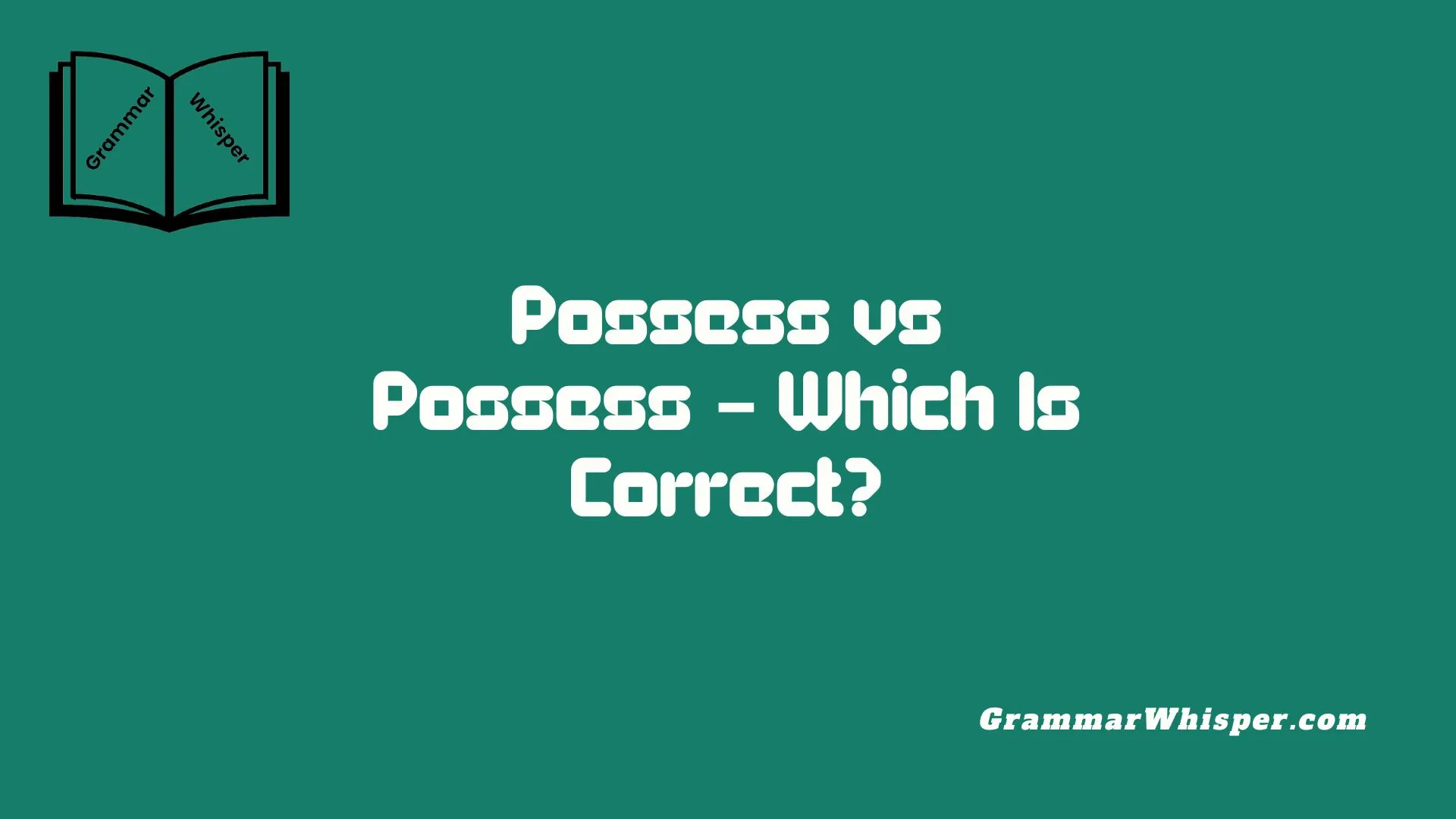When you see “possess vs possess,” it might seem like a trick, but here’s the spoiler – there’s only one valid spelling. The word “possess” is the correct one; anything else is just a mistake. This helpful guide breaks the word apart, cuts through the confusion, and offers clear tips that can help you remember the correct version. I’ve had students bring up lookalike word pairs, and this one pops up a lot in everyday writing. The one that feels right – usually is. And in this case, it truly is.
Try using memory tricks to lock it in. One tip I like: “possess” has double S’s because it “owns” extra letters. Think of that as a fun way to store the spelling in your head. Real-world examples, whether in a blog post, contract, or even a textbook, show the right form in action. Regular practice with spelling tools like flashcards or autocorrect features helps build mastery. Once it’s part of your routine, it becomes second nature. Strong habits and repetition will always offer better results than guessing.
Why “Possess” Looks Tempting (But Is Wrong)
- You hear one “s,” so one seems enough.
- English often doubles consonants: “address,” “process,” “suppress.”
- But this is a typographical trap, not a rule – so don’t fall for it.
Fact: There’s no legit dictionary entry for possess. It’s just a common type of.
What “Possess” Actually Means
Possess is a versatile verb from Latin possidēre:
- To own something – e.g., “She possesses rare coins.”
- To have a quality or talent – e.g., “He possesses great leadership.”
- To control or inhabit (emotionally or supernaturally) – e.g., “Fear possessed her”.
Spelling Breakdown: Why Two S’s Matter
- Etymology: Latin → French → English. The word landed in English with a double‑s.
- Pattern matched: Like “address” or “possessive,” the double-s holds firm.
- Contrast: One’s” version (possess) lacks linguistic backing – no root, no legitimacy.
Mnemonic Tricks to Remember It
- “Double your ownership – double S”: You own it, so you double the “s.”
- Visual aid: Sketch two overlapping dollar signs (SS) whenever you write them.
Rhyming hint: nginx CopyEdit To POSSESS your success,
Don’t forget that extra ‘S’.
“Possess” in Everyday Sentences
Here’s real-world usage:
- Common: “I possess a first-edition novel.”
- Professional: “The software possesses unique capabilities.”
- Figurative: “A spirit possessed her last night.”
- Correcting mistakes:
- ✗ “She possesses a car.”
- ✓ “She possesses a car.”
Common Mix-ups & Traps
- Typos: One “s” by accident or habit.
- Spell‑check fail: Leaning on autocorrect can let “possess” slip into writing.
- Sound confusion: Similar-sounding words – process, possession – blur the memory.
Is Possess” Ever Acceptable?
- Answer: No.
- No dialect or recognized English variation uses possess–it’s always wrong.
| Spell | Correct? | Notes |
| Possess | ✅ Yes | Valid in all contexts |
| Posess | ❌ No | Common typo or misheard spelling |
Extra Help for ESL Writers & Spell‑Check Users
- Common pitfall: Native pronunciation leaves out the second “s.”
- Tools that work:
- Grammarly, Merriam‑Webster’s app, LanguageTool
- Smart exercises:
- Write 5 sentences using possessives correctly.
- Prompt: “I possess…”
- Highlight any variations and self-correct.
Quick Practice Section
Fill in the blanks:
- She ___ the best score in class.
- You must ___ your copy of the student ID.
- The old document was ___ by a famous poet.
➡️ All answers: possesses
Play It Safe: Summary Table
| Word | Meaning | Example Phrase |
| Possess | To own, hold, or control | “He possesses a rare coin.” |
| Possess | Have a quality or apply control | “She possesses strong intuition.” |
| Posess | ❌ Not accepted – typo | (Avoid this form!) |
Digging Deeper: Exceptions & Variations
- “Posses” (one s in middle, es): a plural noun meaning sheriff’s helpers (e.g., “town sheriff led his posses”)
- Possesses/Possessed/Possessing: all derivatives preserve the double‑s.
- Don’t confuse with:
- posset (a hot drink)
- pose (pose a question, assume a position)
- posy (flower)
Case Study: Textbook vs Autocorrect
A student typed:
“The author possesses esoteric knowledge.”
Spell‑check didn’t flag it, but a peer edit fixed it to:
“The author possesses esoteric knowledge.”
Lesson: Rely on knowledge, not just software.
Final Thoughts:
Understanding the difference between possess and possess isn’t just about correcting a typo – it’s about strengthening your grasp of written English. In academic writing, business emails, job applications, and even casual posts, a misspelled word can change how others perceive your attention to detail and professionalism.
FAQS:
What is the correct spelling: “possess” or “possess”?
Possess is the only correct spelling in English. The version” is a common misspelling and does not appear in any reputable dictionary. Always use the version with double “s”.
Why is “possess” spelled with two S’s?
The word comes from the Latin possidēre, which transitioned into Old French and then into English with a double “s.” This spelling helps preserve pronunciation and follows common English patterns found in similar words like “address” or “suppress.”
Is “possess” accepted in British or American English?
No. “Possess” is not correct in any dialect of English – whether it’s American, British, Canadian, or Australian. Both major versions of English use “possess.”
What are some other common words with double S’s like “possess”?
Here are a few examples:
- Address
- Suppress
- Repossess
- Access
- Process: These words follow similar spelling rules where the double “s” appears due to pronunciation, etymology, or grammatical structure.
How can I avoid spelling “possess” incorrectly?
Try these strategies:
- Use a mnemonic: “Double the S to possess success.”
- Practice writing the word in context regularly.
- Use spell-check tools like Grammarly or LanguageTool.
- Read your sentences aloud – hearing the word can help reinforce the correct form.











